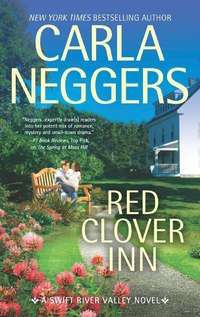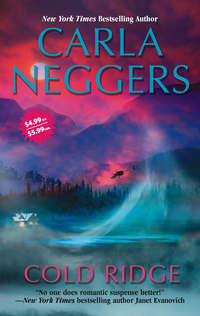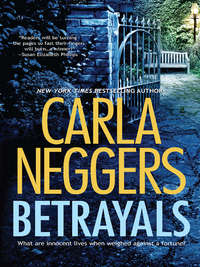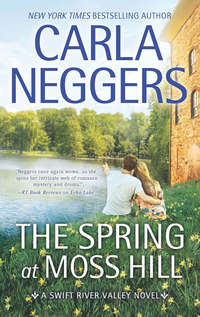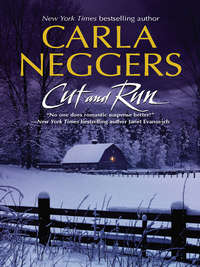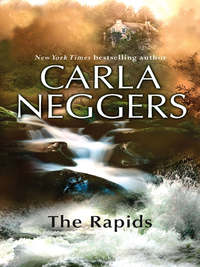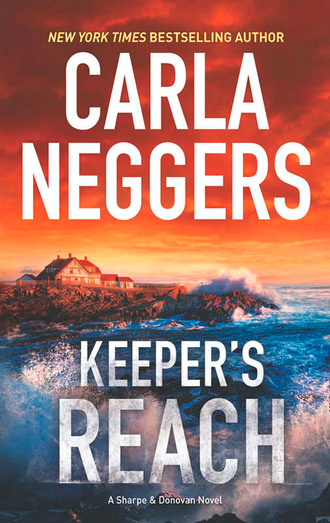
Полная версия
Keeper's Reach

New York Times bestselling author Carla Neggers returns with this absorbing, twisting tale of suspense, romance and fast-paced action, the latest in her popular Sharpe & Donovan series.
Emma Sharpe and Colin Donovan, two of the FBI’s most valuable agents, are preparing for their next big assignment—their wedding—when Colin’s brother Mike alerts them that onetime friends from his military past are on Sharpe and Donovan home turf on the Maine coast. Now private security contractors, they want to meet with Mike. One of them, an FBI agent named Kavanagh, is supposed to be on leave. What is he investigating—or does he have his own agenda?
Mike zeroes in on Naomi MacBride, a freelance civilian intelligence analyst who, aside from a few hot nights, has never brought him anything but trouble. Newly returned from England, Naomi clearly isn’t telling Mike everything about why she’s snooping around his hometown, but he has no choice but to work with her if he wants to uncover what’s really going on.
But the case soon takes a drastic turn—Emma is targeted, and a connection surfaces between Naomi and Kavanagh and a recently solved international art theft case. Not every connection is a conspiracy, but as the tangled web of secrets unravels, Emma and Colin face their greatest danger yet. With everyone they know involved, they must decide who they can trust…or lose everything for good.
Keeper’s Reach
Carla Neggers

www.mirabooks.co.uk
To Jim, Maureen, Martha and Todd
Contents
Cover
Back Cover Text
Title Page
Dedication
1
2
3
4
5
6
7
8
9
10
11
12
13
14
15
16
17
18
19
20
21
22
23
24
25
26
27
28
29
30
31
32
33
34
Author’s Note
Extract
Copyright
1
Near Stow-on-the-Wold, the Cotswolds, England Wednesday, 4:00 p.m., BST
Martin Hambly had expected additional visits from the FBI, but this agent was new to him. Rangy, sandy-haired, early forties. He conveyed an unsettling mix of suspicion and arrogance, with none of the humor of the agents Martin had encountered last fall.
Kavanagh. Special Agent Ted Kavanagh. That was his name.
Martin supposed it could be the case.
The American flashed his FBI credentials as he gave his name, but Martin, carrying clay pots planted with amaryllis bulbs in each arm, didn’t examine them.
Kavanagh tucked his credentials back into his overcoat, a sturdy but inexpensive dark gray wool. He had intercepted Martin on the narrow lane in front of the small village church, an oft-photographed favorite with the few tourists who ventured this deep into the Cotswolds countryside.
“Mr. York isn’t here,” Martin said.
“‘Here’ meaning his farm, the village or England?”
“He’s in England.”
Martin shifted the amaryllis pots in his arms. He had picked them up from friends who ran a flower shop in nearby Stow-on-the-Wold. His decades-old Barbour jacket, wool cap and waterproof walking shoes were adequate for the twenty-minute walk to and from the York farm on a chilly February afternoon, but not for standing still for a long, awkward chat.
“I will tell Mr. York you were asking for him,” Martin said with a deliberate note of finality.
“Okay. Thanks.”
The FBI agent—if, indeed, that was what he was—made no move to continue on his way. Martin didn’t notice a car that could have belonged to him, or a partner lurking down the lane or in the churchyard. In the fall, three FBI agents had arrived at the York apartment in London. Matt Yankowski, Colin Donovan and Emma Sharpe. Martin had expected Oliver to refuse to let them in, but he had instructed Martin to have the agents join him in the library. It was the same library where, twenty-nine years ago, eight-year-old Oliver, an only child, had witnessed the murder of his parents.
Martin decided not to mention the previous agents to this new agent.
“Quiet village,” Kavanagh said.
“Yes, it is. Stow-on-the-Wold isn’t far. It’s a market town with shops and restaurants, if you need anything. Are you staying in the area?”
“Off to Heathrow and home tomorrow.”
It wasn’t an answer, was it?
Martin felt the weight of the pots and now regretted not bringing the car. After two days of rain, he had looked forward to a good walk.
“Why do you suppose they buried people in the churchyard?” Kavanagh asked, nodding to the age-worn gravestones, many standing crookedly, covered in white lichens. The church itself was constructed of the yellow limestone characteristic of countless structures in the rolling Cotswolds countryside west of London. It dated as far back as the twelfth century, but, of course, had been added to and reworked over the ensuing centuries.
“It was the thing to do, I imagine. I’ve never thought about it.”
Kavanagh grinned. “Stupid question from an annoying American?”
“I didn’t say that, sir.”
“You didn’t look surprised when I recognized you. Then again, you’re obviously a man of great self-control. How long have you worked for Oliver York?”
Martin saw no reason not to answer. “I was twenty when Mr. York’s grandparents hired me.”
“You’re what—a valet? A manservant?”
“Agent Kavanagh, if you have a card with your contact information, I can give it to Mr. York.”
“I don’t, in fact.” The American smiled. “Long story.”
Martin doubted that. “I should get cracking. Enjoy your stay, and have a good flight tomorrow.”
“Thanks.” He made no move to go on his way. “You met a few of my colleagues in November. Agents Yankowski, Sharpe and Donovan. Any contact with them since then?”
So, Agent Kavanagh knew about the November visit. “We exchanged Christmas cards,” Martin said, immediately regretting his sarcasm.
Kavanagh laughed. “A smart-ass under all that English formality, aren’t you, Martin?” He nodded at the pots. “What color amaryllises?”
“Both are bloodred.”
“Surprised I know an amaryllis bulb from a tulip bulb, aren’t you? In fact, I don’t. It says so on the little stick in the dirt.”
Chuckling to himself, the American resumed course down the lane, back toward the village, away from the church. Martin debated finding out whether Special Agent Kavanagh was booked at the village pub, which also let rooms.
“Best not,” he said under his breath.
Restless now and decidedly ill at ease, he set the pots on the low wall in front of the church. He was sixty-three and in excellent shape, but the pots were heavier than he had anticipated. A short break was in order before he continued on to the farm. He stretched his arms as he walked in the opposite direction of the FBI agent. The lane ended at the entrance to a cemetery, which adjoined the churchyard but was separate from its scatter of gravestones.
A breeze stirred, and he noticed the sun, a welcome sight earlier in the day, was giving way to a gray, still dusk. Martin watched a lone bird—he couldn’t say what species it was—float above a barren field past the cemetery and disappear over the horizon, as if it wanted to get away from the dead.
His imagination, of course.
He veered off the paved walk, slowing his pace as he cut down a muddy footpath, past bare-branched trees and more graves. He had grown up in the village and had family buried here, but it wasn’t their graves that drew him.
He came to a far corner of the cemetery and paused at a low stone wall that bordered the field. He pulled off his cap and felt the breeze in his graying hair as he breathed in the cool air and tried not to let emotion overcome him.
Finally, he leaned forward and touched the name carved on a cold, gray stone.
Priscilla Farley York.
He shut his eyes, his fingertips on the letters. He could feel Priscilla’s bony, aged hand as she clutched his wrist, and he could see the pain in her dying eyes. She had been frail then, a ghost of the woman who had put him to work. Yet undiminished were the will, the determination and the faith that had seen her through more than any mother and grandmother should have had to bear.
Look after Oliver, won’t you, Martin? He’s suffered so much. Promise me you’ll look after him.
Martin hadn’t hesitated, although he had known, even then, it wouldn’t be an easy promise to keep. He could hear his certainty and sincerity as he answered her. I will look after Oliver. I promise.
Priscilla had died a few hours later.
The next day, Oliver had dropped out of Oxford.
Opening his eyes, Martin touched his fingers to the names on three more York gravestones.
Nicholas York
Charles York
Deborah Summerhill York
Martin had known them all. Nicholas, Oliver’s grandfather, had preceded Priscilla into the grave by eighteen months. He had loved the Cotswolds. The York farm had been in his family for generations, and he and Priscilla had relished retiring there and turning over their London apartment to Charles, their only son, and Deborah, his lovely wife.
Who could have imagined that Charles and Deborah would be murdered?
Who could have imagined Oliver, their eight-year-old son, would be snatched and taken to Scotland, then held alone in a church ruin? Shivering and hungry, the traumatized boy had escaped. No one could say how long he had wandered in the cold Scottish countryside before a priest, on a walk to the ruins, had discovered him.
Oliver’s kidnappers—his parents’ killers—had yet to be captured, convicted and sentenced for their heinous crimes. They’d been identified as groundskeepers the Yorks had hired, briefly, shortly before their murder, but no trace of them had ever been discovered.
When the police had arrived at the farm with the terrible news, Martin had gone to find Nicholas and Priscilla, out with the dogs on the farm. The searing trauma of those days had undoubtedly shortened their lives. Despite their own grief, they had done their best to raise Oliver and get him whatever help he needed.
His throat tight with emotion, Martin turned back through the cemetery. He had dedicated himself to the welfare of the last of the Yorks—Priscilla, Nicholas and Oliver.
Now there was just Oliver.
Martin heard the distant cry of a bird, but otherwise the cemetery was quiet. As the church came into view again, he could see young Charles and Deborah on their wedding day, laughing as they greeted guests. There had been no question they would have the ceremony here in the village.
Martin scooped up the amaryllis pots from the wall. He needed to put aside loyalty, grief, pity and sympathy and see clearly what options were available—especially now with the bloody FBI popping into town for a visit.
He had made a promise. He couldn’t falter, and he couldn’t fail.
He glanced down the lane toward the village center, but he didn’t see the American.
Should he call Emma Sharpe or Colin Donovan and ask them about Special Agent Kavanagh and this strange visit?
Let Oliver make that decision.
A pot in each arm, Martin set off down the lane, cutting onto a public footpath that paralleled the main thoroughfare. It was part of the Oxfordshire Way, one of the many marked walking routes in the picturesque Cotswolds. On his free days, he liked nothing better than to don his walking shoes, choose a loop and set off for the day. Oliver was fit as a fiddle, but he hated to “ramble,” as he put it, preferring endless hours of solitary martial arts practice. Martin suspected his employer and friend’s distaste for country leisure walking harkened back to his kidnapping, but he had never asked—and he never would. Heart-to-hearts would only make them both uncomfortable, and Martin had decided years ago that some things he was best not knowing for certain. Guessing was enough for him.
Oliver would be in from London tomorrow. Martin would have the morning to see to errands and deliveries and get the house prepared for Oliver’s arrival. He was inviting a friend, he had said. An Irish priest Martin had yet to meet.
You’ll like him, Hambly. He’s a whiskey expert. He and his twin brother own an Irish distillery.
It was a marginal recommendation. Martin preferred Scotch.
Nonetheless, he appreciated that Oliver was making an attempt to turn over a new leaf and have real friends. Martin would be sure the guest suite was immaculate and fires were lit throughout the house, ready for their arrival.
* * *
Converting the small dovecote on the edge of the farm’s main grounds into a potting shed had been Priscilla York’s idea. Although the family employed a gardener, she had loved to putter with her pots and seeds. Martin had spent many hours helping her, although he didn’t pretend to have her knowledge, expertise or interest in gardening.
Adding a stonework studio to the dovecote twelve years ago, long after his grandmother’s death, had been Oliver’s idea. He hadn’t asked Martin for help, opinions or approval and went about stocking the studio with lapidary saws, heat guns, polishing wheels, hammers, chisels and various kinds of glue. Stone-carving became another of Oliver’s solitary hobbies. Martin had thought no harm could come of it.
One of his more spectacular miscalculations.
He set the pots on a rough-wood worktable. Deep red amaryllis blossoms would provide welcome color before spring returned. He felt his tension and melancholy lifting after meeting the FBI agent and visiting the graves. He envisioned hillsides of daffodils, fields of bright yellow rapeseed, lambs prancing with their mothers. Truly, was there anything more glorious than springtime in the Cotswolds?
He helped himself to a bottle of water he kept on the worktable and groaned when he noticed a package by the door. He had forgotten about it. Oliver had packed it himself before departing for London late Monday. Martin had no idea what was inside and wasn’t about to rip it open to find out. Surely it couldn’t contain anything provocative, since it was addressed to Emma Sharpe, one of the FBI agents from November.
Martin noticed Oliver hadn’t used Agent Sharpe’s Boston home or office address, which, to the consternation of the FBI, were in his possession. Instead, he had addressed the package to her in care of Father Finian Bracken at the St. Patrick’s Holy Roman Catholic Church rectory in Rock Point, Maine.
Oliver’s new friend, the Irish priest.
Father Bracken was also Emma Sharpe and Colin Donovan’s friend, an awkward and potentially incendiary situation in Martin’s estimation.
He rang the courier service, catching them in time to pick up the package for overnight service to the United States. He wasn’t surprised to discover Oliver had done a perfunctory, inadequate packing job. He added more tape before setting the package outside on the doorstep. He would wait for the courier. Then an early supper and some well-placed acupressure on his sore arms were in order.
He heard a rustling sound behind the dovecote, which sat atop a wooded hillside above a stream.
“Not the bloody ram again,” he muttered.
The stubborn beast refused to stay within the fence. He liked to escape the confines of his carefully maintained pasture and romp through forbidden territory. Farm animals weren’t Martin’s responsibility, but he couldn’t leave the sheep to his own devices. At the least, he could assess the situation and then call for help if necessary. If it was the ram and he wasn’t in too big a fix, Martin could manage to get him back into his pen on his own—if grumbling the entire way.
He went around to the back of the dovecote. The ground was soft and wet, no surprise given the two days of rain. At least it hadn’t been snow. He noticed with pleasure that snowdrops were in bloom, blanketing the grass around an oak tree with their tiny white flowers, a welcome harbinger of spring.
The hillside was darkened with dusk and shadows, but not so much so Martin would be unable to see a wandering sheep. Still, he saw nothing. He paused, listening, but he couldn’t make out any bleating.
Perhaps it had been a fox or pheasant he had heard, stirring with the warmer weather and now on its way.
“Well, good, then,” Martin said aloud, turning back toward the dovecote.
Then came a scraping sound...metal on metal...as distinct and unmistakable as his own breathing.
Now what?
It had to be the ram. He must have caught on something.
Martin decided to have another look then get a farmworker out here.
Then came a grunt, distinctly human and close.
“No!”
Martin heard panic and fear in his voice. His heart jumped, adrenaline surging painfully through him as he tried, instinctively, to dodge what he knew was an oncoming blow.
He was too late.
The blow came quickly, hard, to the back of his head, sending him sprawling down the hill. He couldn’t get his footing and crashed against winter-denuded trees and brush, until finally landing facedown in wet grass and dead leaves.
He was vaguely aware of the taste of mud and the stab of a twig in his cheek as pain exploded in his head.
Bastard.
Unable to breathe, he gasped in agony, fighting to stay conscious as he sank into the cold ground and the inevitable blackness.
2
Boston, Massachusetts Wednesday, 3:00 p.m., EST
Emma Sharpe was in love with her wedding gown. Totally, absolutely in love. It was silky, simple, flattering and exactly what she had envisioned. She took a selfie in the fitting room of the Newbury Street shop and texted it to her mother in London, who responded immediately.
It’s perfect. I’m sorry I’m not there.
Emma didn’t mind. Her father was recovering from his latest procedure to help ease his chronic back pain due to a long-ago fall on the ice, and her mother was at his side. For most of the past year, they had been living and working abroad, away from reminders of the past, and of the future they had once envisioned for themselves. Their hometown of Heron’s Cove, Maine, had become a trigger for emotional and physical pain.
Her parents had promised to return for Emma’s spring wedding. That was enough, she thought as she eased out of the dress. It was pinned for alterations. She smiled at her reflection, her fair hair a bit flyaway from the dress and the dry winter air. From her late teens into her early twenties, she had believed she would never marry. She had been Sister Brigid then.
She thought of Colin, a hardheaded Maine Donovan, an FBI undercover agent and her fiancé since he had proposed on bended knee in early November in a Dublin pub.
She was Sister Brigid no more.
She slipped back into her jeans, sweater and boots and grabbed her three-quarter-length wool coat, hat and gloves as she exited the dressing room. She’d left work early for the fitting but had stopped at her Boston waterfront apartment to change out of her work clothes. Around the same time her parents had left for London, she had moved to Boston to join HIT, a small FBI team started and led by the senior agent who had recruited her out of the convent. Matt Yankowski had never doubted his conviction that Emma wasn’t meant to profess her final vows and become a full-fledged member of the Sisters of the Joyful Heart.
We can use your expertise in art and art crimes, Yank had told her when he had visited her at her Maine convent four years ago. Give it some thought, Emma.
He hadn’t called her Sister Brigid.
Her early expertise in art crimes hadn’t come from her time at the convent. She was the granddaughter of Wendell Sharpe, founder of Sharpe Fine Art Recovery and one of the foremost private art detectives in the world.
As she ducked out onto the Back Bay street, her phone dinged with another text. Although it was from London, it wasn’t from her mother. It was from Oliver York, aka Oliver Fairbairn, a British aristocrat, self-educated mythologist and international serial art thief.
Who is the FBI agent following me?
Emma stared at the screen. There was no FBI agent following Oliver. She would know if there were. She typed a quick response.
I’ll call you in an hour.
Oliver responded immediately.
I’ll be waiting.
* * *
Lucy Yankowski buzzed Emma into the third-floor apartment she had just rented on Marlborough Street, two blocks from the Newbury Street wedding shop in Boston’s Back Bay. “Matt hasn’t seen it yet,” she said as she led Emma into the living room. “He’ll love it, don’t you think?”
“From what I can gather, he’ll love anything that isn’t infested with cockroaches.”
Lucy shuddered. She was a small woman with dark hair cut short and edgy, something of a new look for her as she reinvented herself in Boston. She hadn’t wanted to move from northern Virginia. It had taken her a year to decide saving her marriage was worth giving up her life in suburban Washington, DC. Her reconciliation with Yank—Matt, as she called her husband of fifteen years—hadn’t been without drama or peril, and it didn’t mean her new life in Boston was settled. For one, she was a clinical psychologist and was talking about giving it up to open a knitting shop.
First order of business, however, had been to find the “perfect apartment.” As far as Emma could see, there was no question Lucy had done just that.
“I insisted on a washer and dryer in the unit, and I wanted a decent view—I didn’t want to drink my morning coffee looking out at trash cans. I swear I manifested this place, but I’m not sure I believe in that stuff.”
She gave Emma the grand tour, starting with the living room and moving into the bedrooms—there were two—and dining room. Although small given its upscale location, the apartment was a far cry from the cheap, roach-infested one-bedroom Yank had rented, thinking he would be there for a couple of months at most. Like the rest of Back Bay, Marlborough, one of Emma’s favorite streets in Boston, had been underwater before the massive nineteenth-century project that had created the gracious neighborhood, now known for its tree-lined streets and Victorian brownstones.
“Look,” Lucy said, smiling as she raised a shade when they returned to the living room. “We have a tree outside the window. Imagine it in the summer. When do you get leaves on the trees up here?”
“May for sure,” Emma said. “I count on full leaf bloom by Memorial Day at home in Maine.”
“Gad. It’s too late to change my mind. We’ve already signed the lease.” She sighed, gazing out at the bare-limbed tree. “I’m sure there are quirks, but I couldn’t be happier with this place. Matt will freak out if he sees a roach, but it’s the city. There are bound to be roaches. We sleep with a can of Raid and a flyswatter next to the bed in our current apartment.”






